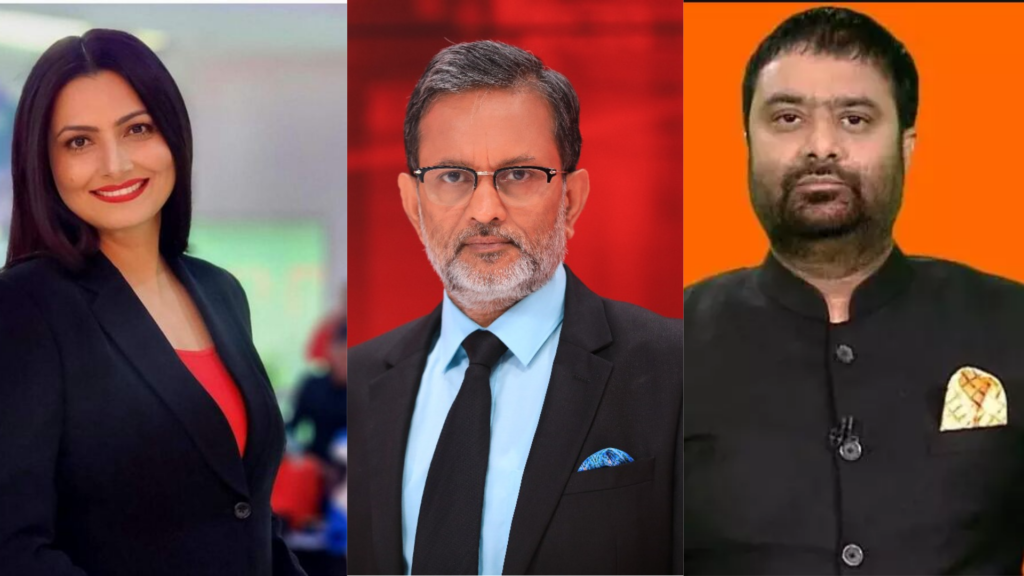In a surprising turn of events, a Gurugram court recently issued non-bailable warrants against several high-profile journalists, including Chitra Tripathi, Deepak Chaurasia, Syed Suhail, and Ajit Anjum. This case pertains to alleged violations under the Protection of Children from Sexual Offenses Act (POCSO), stemming from their coverage of the Asaram Bapu case in 2013.
The Case’s Origin
In July 2013, self-proclaimed godman Asaram Bapu visited a family’s residence with his followers. Photographs were taken as part of this interaction, capturing the family’s daughters and other members. These were normal family moments, taken without any ill intent.
However, after Asaram’s arrest in August 2013 on charges of raping a minor, these images were broadcast by media outlets in sensationalized programs. Popular news channels and their journalists displayed inflammatory captions such as:
- “Asaram’s MMS”
- “Asaram’s Dirty Picture”
These broadcasts used the family’s photos, portraying them as linked to heinous crimes like sex rackets. This gross misrepresentation prompted the family to take legal action.
Legal Action Against Journalists
The family alleged that the media:
- Defamed Their Reputation: By linking them to criminal activities.
- Violated POCSO: By using images of minors in a sexualized narrative.
- Spread False Claims: Misleading captions and visuals caused irreparable harm to their dignity.
The POCSO Act, known for its stringent provisions, includes penalties for broadcasting or misusing children’s images in any context that implies abuse or misconduct.
Journalists Involved
The case named several prominent journalists:
- Chitra Tripathi: Known for her influential presence in Indian journalism.
- Deepak Chaurasia: A senior journalist with years of experience.
- Syed Suhail: Known for his editorial roles in major networks.
- Ajit Anjum (an independent journalist): A prominent figure in the industry.
Court’s Decision
A non-bailable warrant was issued against these journalists, with the court rejecting their pleas for relief. Their argument of being busy with election coverage in Maharashtra and Uttar Pradesh was deemed insufficient. The court instructed the police to ensure their presence, even if arrests were required.
Implications of POCSO Violations
The POCSO Act is not limited to direct offenses against children. It also penalizes the misuse of children’s images, as seen in this case. The charges indicate that:
- Broadcasting children’s images inappropriately is punishable.
- Portraying innocent minors as linked to sexual offenses invites stringent legal action.
Impact on Indian Media
This case underscores the critical need for responsible journalism. Key lessons include:
- Ethics Over Sensationalism: Sensitive cases, especially involving minors, require thoughtful reporting.
- Thorough Research: Reporting unverified claims or misrepresenting facts can lead to severe legal consequences.
- Accountability: Journalists and media houses must adhere to ethical and legal standards while covering sensitive topics.
Also Read: Centre Opposes Criminalising Marital Rape, Argues it Would Undermine Marriage Institution
Conclusion
The involvement of high-profile journalists highlights the gravity of this case. It’s a stark reminder of the responsibilities that come with media freedom. While the court proceedings will determine the final outcome, this case has already emphasized the need for ethical journalism and adherence to legal boundaries.
Disclaimer
The content provided here is for informational purposes only. All information is based on publicly available data and does not intend to malign any individual or organization.
Also Read: Cuttack Gang Rape Case: Six Arrested for Repeatedly Raping College Student
Follow US

